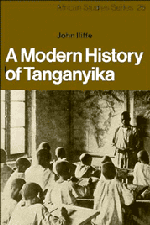Book contents
- Frontmatter
- Contents
- List of maps and tables
- Preface
- Acknowledgments
- Terminology
- Abbreviations
- Map I Tanganyika
- 1 Intentions
- 2 Tanganyika in 1800
- 3 The nineteenth century
- 4 The German conquest
- 5 Colonial economy and ecological crisis, 1890–1914
- 6 The Maji Maji rebellion, 1905–7
- 7 Religious and cultural change before 1914
- 8 Fortunes of war
- 9 The origins of rural capitalism
- 10 The creation of tribes
- 11 The crisis of colonial society, 1929–45
- 12 Townsmen and workers
- 13 The African Association, 1929–48
- 14 The new colonialism
- 15 The new politics, 1945–55
- 16 The nationalist victory, 1955–61
- Bibliography
- Index
- Frontmatter
- Contents
- List of maps and tables
- Preface
- Acknowledgments
- Terminology
- Abbreviations
- Map I Tanganyika
- 1 Intentions
- 2 Tanganyika in 1800
- 3 The nineteenth century
- 4 The German conquest
- 5 Colonial economy and ecological crisis, 1890–1914
- 6 The Maji Maji rebellion, 1905–7
- 7 Religious and cultural change before 1914
- 8 Fortunes of war
- 9 The origins of rural capitalism
- 10 The creation of tribes
- 11 The crisis of colonial society, 1929–45
- 12 Townsmen and workers
- 13 The African Association, 1929–48
- 14 The new colonialism
- 15 The new politics, 1945–55
- 16 The nationalist victory, 1955–61
- Bibliography
- Index
Summary
The Second World War transformed Tanganyika's relationship with Britain. With an exhausted economy, colossal debts, and a disintegrating Asian empire, Britain at last needed even Tanganyika's meagre resources, if they could be extracted. The post-war decade therefore saw a ‘second colonial occupation’ embodied in development planning and secondary industry, cash-crop expansion and agricultural improvement schemes, educational advance, constitutional progress, and local government reform. Yet as in earlier colonial empires, increased imperial control antagonised subjects who had often acquiesced in lighter suzerainty. Active government created grievances to stimulate political activity and provided resources to make it effective. The new colonialism followed nearly twenty years of crisis, and although in the short term it checked African political development, in the long term it only accentuated the crisis, widening regional and social disparities, reinforcing the structural contradictions of colonial society rather than bringing structural change, and intensifying the process of uneven and combined development. Moreover, the new colonialism contained a contradiction, for while some expected it to restore Britain's power, others saw it as a means of creating friendly successor states. The balance between the views remains uncertain, however, for records are often closed after 1945 and we know progressively less about Tanganyika's history as we approach the present.
- Type
- Chapter
- Information
- A Modern History of Tanganyika , pp. 436 - 484Publisher: Cambridge University PressPrint publication year: 1979
- 1
- Cited by

